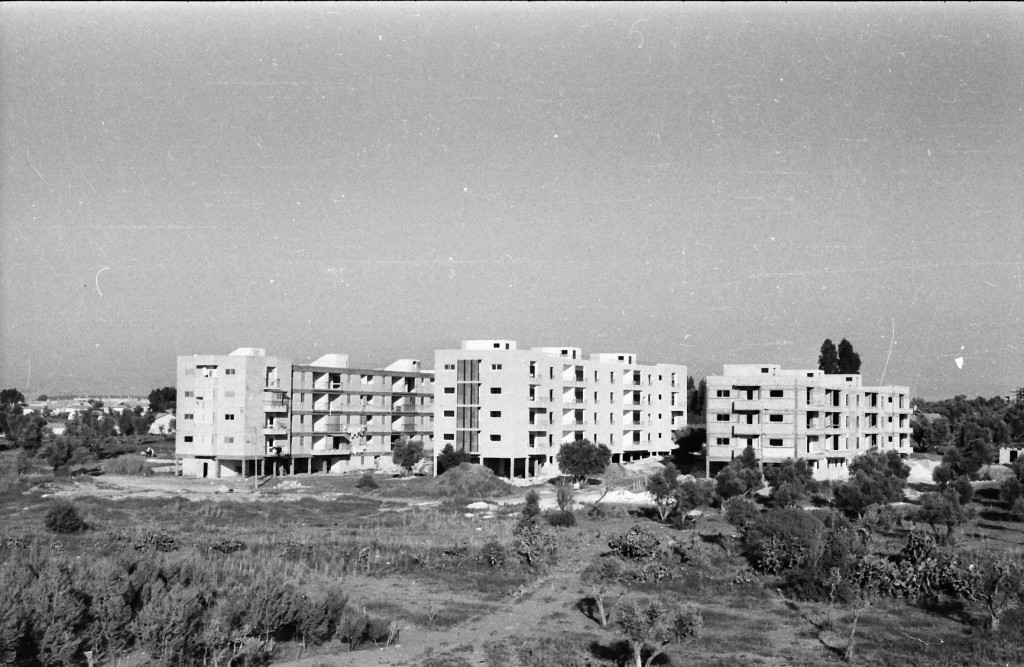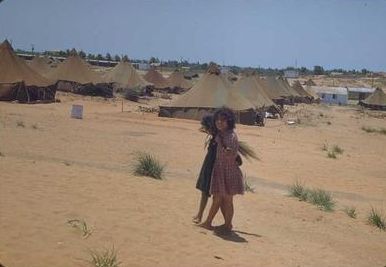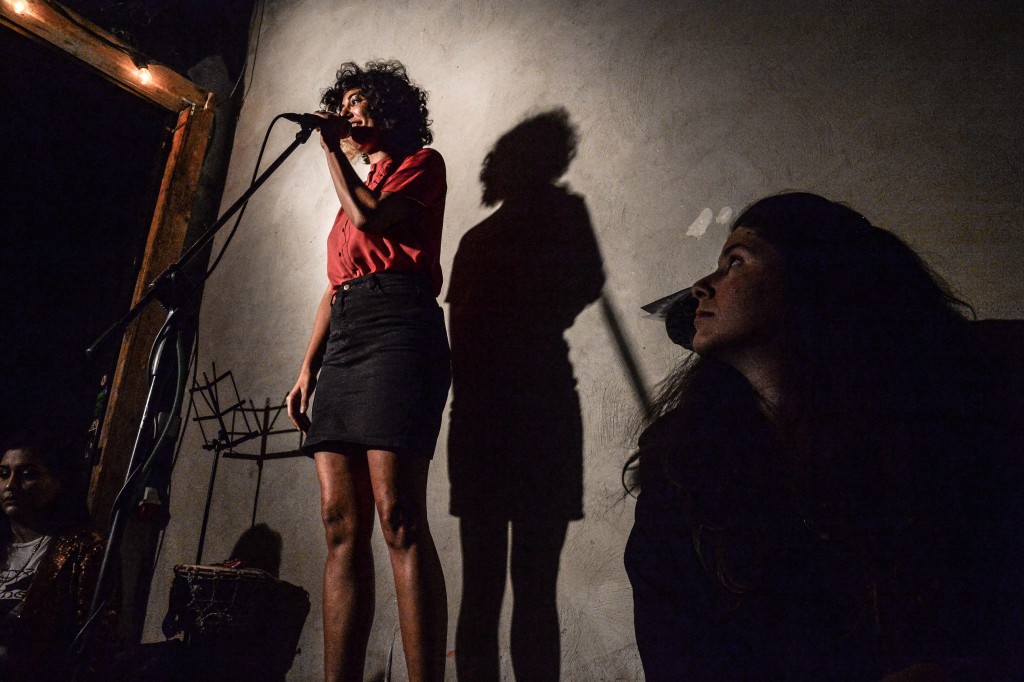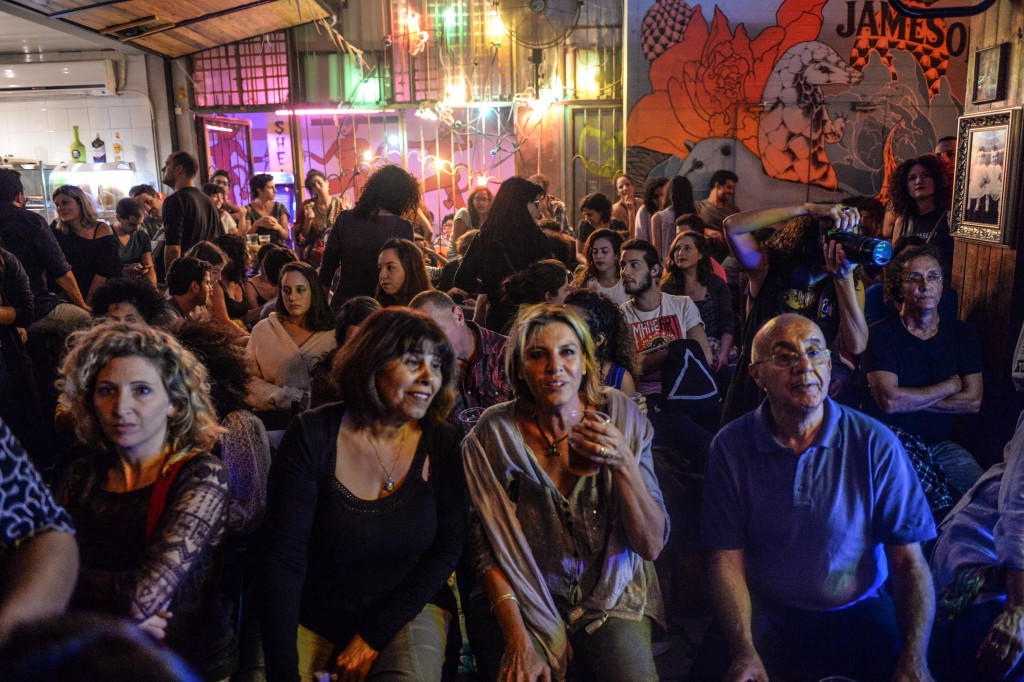A new Israeli literary movement is gaining popularity by criticizing the very class of people who praise it most highly. The Mizrahi poets of Ars Poetica have a lot to say—and the whole country is listening. Photos: Aviram Valdman
I first heard about Ars Poetica at a Shabbat meal in Jerusalem’s yuppie neighborhood, Katamon. I sat around enjoying green beans, potato kugel, and rugelach—all staples of a Shabbat meal hosted by millennial Ashkenazim, Jews of Eastern European descent—and listened in amazement at how my newfound friends—North American immigrants and second-generation Israelis who befriended each other at Hebrew University—debated the efficacy of the grassroots poetry movement currently captivating the Israeli cultural scene.
Popularized by the likes of Roy Hasan and Adi Kaisar, Ars Poetica is a new genre of poetry gaining popularity in Israel, which expresses the experience of Mizrahim, Jews of Middle Eastern and North African descent. The genre includes many writers, like Hasan and Kaisar, who were frustrated by the Ashkenazi influence that dominates the Israeli cultural scene in general and the world of literature in particular. The movement’s name serves as a way to reclaim the word “ars,” which stems from the Arabic word for “pimp,” “shepherd,” or “bad guy,” the slang derogatory term used to describe greasy, smarmy Israeli men, often stereotyped as being of Middle Eastern descent. The name is a way for them to sing the song of their souls, the ballad of their identity. It is a way to communicate the trials and tribulations as well as the vivid culture of the Mizrahim in a way that has never been done in modern history.
Over the summer, right around when I landed in Katamon for that Ashkenazi-heavy Shabbat meal, Hasan was awarded the esteemed Bernstein Prize for literature, becoming the first Mizrahi poet in Israeli history to win the prize, and the second Mizrahi in Israel’s history to receive a top literary award. The first was Erez Biton, 74, the spirit guide of the Ars Poetica movement, who was awarded the Israel Prize for Hebrew Literature and Poetry just one year earlier.
The men and women of Ars Poetica have managed to put words to the experience of feeling like a second-class citizen in their homeland. They capture the pain of their parents and grandparents as they tried to integrate into this Ashkenazi-dominated Middle Eastern land: They capture the discrimination that many of them face even now. So it struck me as ironic, to say the very least, that the biggest proponent of Ars Poetica at the Katamon Shabbat meal was the crème de la crème of the Ashkenazi elite, the type Hasan describes in his poem “If There Will Be Peace, All the Arsim Will Come.”
I just love those people;
All the socialists who hate Capitalism
So ostentatiously, wearing those disgusting sandals
And torn t-shirts, wrapping themselves
In a homeless look, without telling anyone
About Grandma’s inheritance or Dad’s investments
(They look homeless too)
And they criticize the affluent culture
As if they were prophets here to rebuke us with a rumbling stomach.
And yet, there he sat, in his khaki slacks, his wrinkled short-sleeve white shirt, and, of course, his disgusting sandals, praising the poets who hold him in deep contempt. “It’s just brilliant,” he said to the eight or so of us, all educated professionals and master’s students. “The way they call the Israeli elite out on their bullshit. Just great.” With his “learn German” books that he brought to the meal, to ensure we noticed his cleverness, I wondered if it altogether escaped him that the poem was about him. That’s the beauty of Ars Poetica: even some of those that it, in essence, rips to shreds still laud its artistic beauty, its bold truths.
But it’s not all-smooth sailing for Hasan and his contemporaries. Though Ars Poetica is taking off, Hasan and Kaisar, among others, are facing harsh criticism from across the spectrum. Ashkenazi elitists don’t think his poetry is up to par, since it doesn’t conform to their standards and deviates from the status quo. Mizrahim, on the other hand, are criticizing Hasan for accepting a position at Tel Aviv University, the academic bastion of Ashkenazi culture, saying he is just selling out and joining the Ashkenazim.
Discrimination against Mizrahim in Israel didn’t happen in a vacuum: It began, en masse, in the early years of the state.
Erez Biton moved to Israel with his family from Algeria in 1948 or ‘49—family history and official documentation conflict, according to a profile of Biton in the Times of Israel. Six-year-old Biton and his family were some of the first Jewish-Arab immigrants to arrive in the fledgling state.
Upon arrival, the Bitons were sent to a transit camp outside of Ra’anana that served as a stepping-stone before Mizrahim could be integrated into Israeli society. The Bitons were only there for one year, but other Mizrahim weren’t so lucky. Some were stuck there or similar camps for longer than that. Others were subjected to a much worse fate: the ma’abarot, squalid refugee cities on Israel’s settled periphery, often in the south, that existed between 1950 and 1959.
The ma’abarot are a dark stain on the tapestry that is Israeli history. In 1951 alone, eight years before the program was shut down, a quarter of a million people were living in these tent cities. The quality of living was below sub-par. They often had no running water or electricity, and were forced to share filthy restrooms between dozens of people. There wasn’t education for the children, either, some of whom were living there for significant portions of their adolescence. In the summer, the tent were sweltering, and in the winter, freezing. It was unrelenting.
Some politicians, such as Zalman Aranne of the ruling Mapai party, insisted that the immigrants and refugees needed better living conditions. If not, he said, the results would be “catastrophic.” But Prime Minister David Ben-Gurion decided that any alternative to the dilapidated shacks would be too expensive for a country with little industry or infrastructure. “People can live for years in tents,” he said. “Anyone who does not want to live in them needn’t be coming here.”
Polish immigrants received priority housing. They were not resigned to living in tents and shacks, using filthy, barely-functioning toilets. There was an unspoken favoritism, a rule that the Ashkenazim would be given priority.
But many of the Mizrahim had nowhere else to go. When Israel had gained independence in 1948, life for Jews in Arab countries took a turn for the worse. Israel’s defeat of six Muslim states left the Arab world licking its wounds and seeking revenge. They could not yet retaliate against the nascent state, but they could make life torturous for their Jewish citizens. And they did.
In Libya, Jewish businesses were burned to the ground. In Syria, anti-Jewish riots erupted, and the government froze Jewish bank accounts. In Egypt, bombs were detonated against Jewish targets. “From Algeria to Yemen, thousands of Jews were murdered in violent crimes instigated by the Arab governments themselves,” Israeli ambassador to the UN Ron Prosor recounted in a recent panel discussion at the world government’s headquarters.
Jews fled in droves. Those with means went to Western countries like the United States and France. Others, who weren’t able to go farther West, or who were driven by ironclad idealism, came to the nascent state of Israel. Many were forced to flee in the dead of night with nothing but the clothes on their backs. Recovering from a war in which a full percent of its population had died, Israel was hardly in a position to aid these Jewish refugees, but nonetheless took them in—including my great aunt Hasibita Toledano, who immigrated to Israel from Morocco in 1956. The refugees were promised a better life: homes, happiness, and a place where they could thrive. And maybe that was true for the Ashkenazim, but for the Mizrahim, it was not a blooming desert.
Biton’s family was among droves of Moroccan and Algerian Jews who were moved to Lod, the site of an Arab massacre just three years before. Biton and his siblings were able to integrate into the neighborhood and the limited Israel they were exposed to more easily than their parents. The isolation of Lod, separating the Mizrahi immigrants from their Ashkenazi brethren, hindered the adults’ integration, especially emasculating the men, who were no longer able to provide for their families. Lacking an agrarian background, they were ill-equipped for physical labor. Mizrahim had mostly been merchants and sellers in their countries. In Israel, they were not afforded such opportunities.

The city of Lod was quickly developed in response to the wave of Jewish refugees from Arab countries. Photo: Mihael Almagor / Wikimedia
Biton remembers his father’s struggle when they were in Lod. His father, who he describes in one poem as a man who welcomed the Sabbath with pure arak and as the most versed in the laws of the synagogue, was forced into manual labor. It reached a point where he had no other options. “He was very bitter, tired, engaged in a daily struggle to survive,” Biton told the Times of Israel.
But Biton didn’t have that experience. He quickly made friends with other immigrant children in Lod. When he was 11, Biton was playing with some friends in a field near his home. He happened upon a box and, thinking he stumbled upon an ancient treasure chest, he opened it. In an instant, a latent hand grenade exploded, blinding him and causing him to lose his left hand.
After he healed, Biton’s parents knew he wouldn’t be able to stay in the school in Lod—they had no way to accommodate for the blind. Through friends of his parents, Biton was admitted to the Jewish Institute for the Blind in Jerusalem—an Ashkenazi school. There, he was given access to same education as the Ashkenazim around the country. There, he also learned poetry.
He has admitted that had he not been blinded, he never would have become a poet and would probably be loading luggage at Ben-Gurion Airport like his childhood friends. The moment he was blinded altered the entire course of Biton’s future, and ultimately the future of Mizrahi literature in Israel.
Go to any Ars Poetica reading you’ll hear a backdrop of Middle Eastern music fill up an entire dimly lit coffee shop, bookstore, or bar. Dozens of audience members and participants, mostly in their twenties and thirties (though some older folks are present) sit on chairs, on the floor, and stand along the walls, listening to the budding voices of their generation read their original work. More often than not, a lone performer takes the small stage, along with a free standing microphone, taking the audience on a journey, their journey. And the reactions are wild and positive—people snap, clap, and psh to show they identify, that they approve, that they crave more.
With just over 8,000 fans on Facebook, this can’t yet be called a viral trend, but in the same way that slam poetry made waves on the poetry scene in North America, Ars Poetica is being noticed. And it’s being noticed by both the Mizrahim who identify with the message and the Ashkenazim who have created the circumstances.
In Hasan’s opus “If There Will Be Peace, All the Arsim Will Come,” he calls out the phoniness so prevalent in the modern Ashkenazi Israeli Left—for “hypocrisy, hegemony, and all around ass-hole-itude,” as Hasan himself said in an interview with the heavily Ashkenazi TLV1 radio.
His views are radical, but not unique. He believes in the equality of all people, social justice, and human rights. He has said he is very far-Left on the Israeli political spectrum, with the exception of the question of Mizrahim. And he expresses the alienation and apathy he and his peers feel at the hand of the social structures created by the Ashkenazi elite. But those criticisms cause a deeper schism in himself: “As someone who holds radical Leftist views I am constantly facing an internal struggle,” said Hasan, “and I know that until a different kind of Left is created here, one that understands the complexities and the ethnic Israeli-Arab diversity and can allow people from the bottom rungs of society to reach the top, I will never have a real political home.”
That, of course, is because of systemic racism, which is still prevalent in Israeli society, in the same way that there is still racism in the U.S., more than 50 years after the civil rights movement. “I would say there’s ‘arsophobia,’” Henriette Dahan Kalev, a professor of politics and gender at Ben-Gurion University, told The Forward. But, she explained, Mizrahim are reclaiming the word “Ars” the way that gays and lesbians are “reclaiming the word ‘queer’ in English.”
The expression of anger and frustration over social discrimination against Mizrahim has taken various forms in the past several decades. In “Sandstorm,” another of Hasan’s poems, he painfully describes the impoverished life in Mizrahi neighborhoods—and poverty in Israel in general. The poem speaks of a poor woman who has nothing, no money. The speaker, who has nothing to give her either, comforts her by saying she has love and family: “It’s just money/and no one ever died from just money,” it says. But the scene rings all too true; the neighborhoods, the lack of social mobility.
Hasan and his contemporizes are different than Biton. Biton’s poetry reads like he was writing about transition, about what he observed, and about how he felt. Perhaps he didn’t yet feel comfortable enough in this new land to criticize the establishment, especially as the establishment was still figuring itself out. The new Mizrahi poets, the first ones to have established and contributed to a genre, have called Biton a sort of father to their movement. And to an extent, since he is the first Mizrahi Israeli poet, he is their literary father. But there’s a stark contrast between what was and what is. While Biton is beautifully descriptive and painfully honest, he’s more conciliatory than Hasan and the other Ars poets, who are aggressive and angry. And the differentiation is not subtle: the new-age poets directly call out the Ashkenazi elite, the government, and social structures.
The people sitting at Ars Poetica poetry readings are visibly political revolutionaries. Sitting before the show starts in their fashionable grungy clothing, or ironically preppy garb, they discuss the latest in Israeli politics, and how they wish things were radically different.
The men and women of this generation are not afraid to speak their mind—they may be an oppressed class, but they will not be silenced.
Biton views this distinction through a different lens: “I distinguish between good poets and poets who aren’t as good,” he told Haaretz. “When I was asked about the poets of the Ars Poetica group, I replied that what I notice primarily is a cry, which is of course painful at social levels. I recognized the same distress that I thought had existed only in the 1970s.”
What remains to be seen is how long the Ars poets’ anti-establishment personas will be maintained. Hasan himself has over 4,000 Facebook followers, both Ashkenazim and Mizrahim, and his work appears in Haaretz regularly. He is quickly becoming a household name, and, among the elite educated class, he already is.
Counter-culture can only remain such for so long, especially in a society that celebrates the hipster, whose flannel shirts, unkempt facial hair, and nerdy glasses are all the rage. At a certain point, anti-establishment movements become so popular that they can’t be part of the counter culture anymore—they’re just as mainstream as everyone else.
Meanwhile in Katamon, the seven locals discussed maybe going to the next Ars Poetica reading, and then spending the weekend in one of their family’s villas in Caesarea.
![]()
Banner Photo: Aviram Valdman / The Tower








